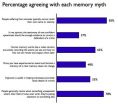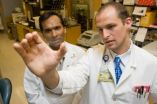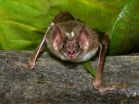The Science Showcase will be open to the public Aug. 5 and 6, near the entrance to the convention exhibits and registration area at the Walter E. Washington Convention Center.
"The science of psychology affects everyone's daily life in ways that most people don't realize," said Steven J. Breckler, PhD, executive director of APA's Science Directorate. "The Science Showcase presents practical uses of psychological research that can be of great service to individuals and society as a whole."
A device known as the vOICe, which helps determine where and what an object is without using eyesight, was selected as best demonstration, with a prize of $3,000. A panel of six psychological research scientists reviewed 13 proposals and also selected two other demonstrations for the showcase: an interactive home energy-use feedback system and a brief task to determine on-the-job fatigue associated with sleep loss.
"Imagine losing your sense of sight and being able to 'see' instead with your ears," said Michael Proulx, PhD, of Queen Mary University in London and presenter of the vOICe demonstration.
Proulx will show how the vOICe maps visual images to sound and provides blindfolded users with a sense of what an object is and where it is located. This reveals that although we think we see with our eyes, sight actually takes place in the brain. Through "sensory substitution," a person deprived of one sense, such as sight, is capable of receiving the missing input through another sense, such as hearing, Proulx explained.
The vOICe maps visual images to sound via three primary dimensions: pitch, loudness and timed-stereo panning, which is much like panning with a video camera to keep an object within a picture while giving a panoramic view. For example, for vertical location, "up" is represented by high frequencies and "down" by low frequencies. Horizontal location is indicated by the time it takes for a left-to-right scan of each image. Bright white is heard at maximum volume and dark is silent.
Long-term users of the vOICe who experience visual imagery via the device "can actually see with sound," Proulx said.
Another demonstration, called the uci@home project, will show how integrating psychology with emerging technologies can help people save on their home energy bills. Audience members can participate in a hands-on demonstration in a mock living space with lighting, energy and temperature sensors that deliver real-time information. The at-home system consists of five to 10 "smart plugs" that communicate wirelessly with a central hub. Each plug contains sensors to monitor power consumption, temperature and lighting, sending updates to the hub every three seconds. Consumers can see the information on their home computer or smartphone, while feedback via lighting and sound comes directly from the plugs.
"They will be able to see the difference in how much energy they are using and the cost savings associated with changing light bulbs, for example, compared to turning lights on or off," said presenter Beth Karlin, of the University of California, Irvine. "Differences in what type of information is presented to consumers as well as how much and how often it is presented can have a large impact on its effectiveness in leading to behavior change. Research suggests that energy conservation feedback is effective when it is frequent, long-term, clear, customized, appliance-specific and interactive."
The uci@home project is a collaboration among University of California, Irvine, Schools of Engineering, Social Ecology and Physical Science, led by physics professor David Kirkby, PhD, and psychology professor Daniel Stokols, PhD.
The third demonstration will show how astronauts working in space can test themselves to see if they are too fatigued to do their job safely. Invented by sleep expert and psychologist David Dinges, PhD, the test is known as the Psychomotor Vigilance Task (PVT). The PVT assesses changes in sustained attention, response speed, and impulsivity associated with sleep loss, and can help determine how fatigue can impair performance in safety-critical occupations such as in transportation, medicine, the military, and space exploration.
David Schroeder, PhD, retired researcher with the Federal Aviation Administration's Civil Aerospace Medical Institute, will discuss technology used to better understand the relationship between sleep, fatigue, and performance. The demonstration will include a three-minute, laptop version of the PVT self-test, designed to meet the limited time constraints of astronauts. It can identify impulsive responses made before a signal and other immediate feedback that allows the person taking the test to compare his or her performance with someone who is fully alert. A handheld digital device that incorporates a PVT measure to gather data on activity and sleep, including a voice recording for evidence of fatigue, will also be demonstrated. The device was used recently in support of an FAA investigation of fatigue in flight attendants.
###
For more information about the Science Showcase and the demonstration schedule, visit http://www.apa.org/science/programs/science-showcase.aspx.
The American Psychological Association, in Washington, D.C., is the largest scientific and professional organization representing psychology in the United States and is the world's largest association of psychologists. APA's membership includes more than 154,000 researchers, educators, clinicians, consultants and students. Through its divisions in 54 subfields of psychology and affiliations with 60 state, territorial and Canadian provincial associations, APA works to advance psychology as a science, as a profession and as a means of promoting health, education and human welfare.
Science Showcase Schedule
Friday, August 5
9:30 a.m. Beth Karlin Energy research for the smart home: The uci@home project
10:30 a.m. David Schroeder Psychology, technology and fatigue assessment
11:30 a.m. Michael Proulx Seeing with your ears? Sensory substitution with The vOICe.
1: 30 p.m. Michael Proulx Seeing with your ears? Sensory substitution with The vOICe.
3:00 p.m. David Schroeder Psychology, technology and fatigue assessment
Saturday, August 6
10:00 a.m. Beth Karlin Energy research for the smart home: The uci@home project
11:30 a.m. Michael Proulx Seeing with your ears? Sensory substitution with The vOICe.
1:30 p.m. David Schroeder Psychology, technology and fatigue assessment
3:00 p.m. Beth Karlin Energy research for the smart home: The uci@home project
Contact informaton:
"Seeing with your ears? Sensory substitution with the vOICe," Dr. Michael Proulx, m.proulx@qmul.ac.uk, office: +44-20-7882-7484
"Energy research for the smart home: The uci@home project," Beth Karlin, bkarlin@uci.edu, office: 949-544-1496, cell: 714-296-1118.
"Psychology, technology and fatigue assessment," Dr. David Schroeder, davids20@cox.net , cell: 405-641-0130
END



